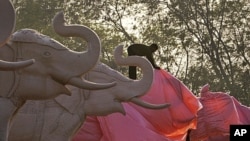In India, statues of a flamboyant low-caste political leader and her party’s symbol in the northern state of Uttar Pradesh have been covered ahead of state elections to avoid influencing voters. The towering statues, erected by Mayawati (one name only) in one of the country’s poorest states, have been the center of a raging controversy.
The scores of larger-than-life bronze, marble and stone statues, which have been draped in cloth and plastic sheets, are those of Uttar Pradesh Chief Minister Mayawati and elephants, her party’s symbol.
The statues were erected in public parks in several towns in Uttar Pradesh, including the capital, Lucknow, and on the outskirts of New Delhi after the low-caste or Dalit leader won a sweeping victory in the state five years ago.
As Uttar Pradesh heads to the polls next month, the Election Commission ordered that the statues be covered to ensure a level playing field for all political parties. They have cited rules under which portraits and photographs of ruling leaders must be removed from government offices.
Complying with that order has been no easy job. Since Monday, trucks of plastic sheeting have been ferried as workers clamber on bamboo ladders to cover the statues.
This is not the first time the statues have attracted national attention - much of it critical. Since their installation in the last two years, at a cost of more than $250 million, Mayawati has been slammed on various counts: for wasting public money, for self glorification and for violating the common practice of erecting statues posthumously.
The firebrand leader dismisses the criticism and calls the statues a symbol of low-caste empowerment.
Ajoy Bose, a political analyst and author of a biography of Mayawati, says the statues are both part of her flamboyant persona, which has won her the title “Dalit Queen,” and a canny political move to appeal to the low castes.
“She is a in-your-face kind of politician. Mayawati’s personality is such that she is always been confrontationist, and she likes to flaunt herself. She is naturally a flamboyant leader. But also there is a method in her flamboyance, a method in what some consider madness," Bose explained. "Because I think she knows that because she makes these fairly bold and outrageous moves and gestures, including these statues, it captivates the Dalit mind, who have been oppressed for so long that they need a larger-than-life figure to lead them.”
Mayawati’s party, the Bahujan Samaj Party, has slammed the order to cover the statues, asking if other symbols of other parties such as lotuses would be removed from ponds or cycles banned.
Uttar Pradesh is one of India’s poorest, but also one of its largest and most politically sensitive states. If Mayawati wins power again, she could become an influential political player on the national scene.
Statues Covered Ahead of State Elections in India




